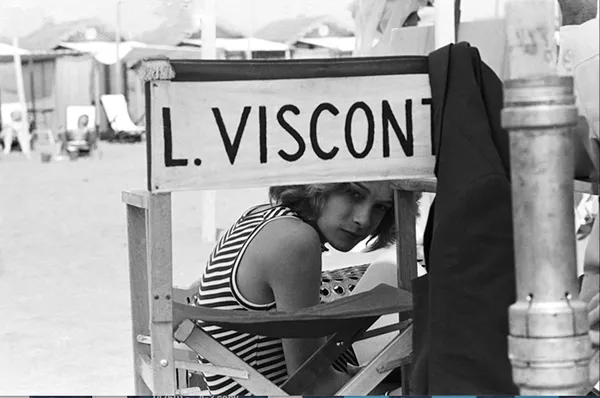 |
| Björn Andrésen at age 15 had his life turned upside down when Luchino Visconti anointed him to play Tadzio in his film version of Thomas Mann’s Death in Venice |
Björn Andrésen at age 15 had his life turned upside down when Luchino Visconti anointed him to play Tadzio in his film version of Thomas Mann’s Death In Venice, starring Dirk Bogarde and pronounced him to be “the most beautiful boy in the world”.
Andrésen in Ari Aster’s Midsommar plays a man who has reached the end of his life. In Kristian Petri and Kristina Lindström’s claustrophobic and disquieting documentary The Most Beautiful Boy In The World (Världens Vackraste Pojke), produced by Stina Gardell (Stig Björkman’s Ingrid Bergman: In Her Own Words and Joyce Carol Oates: A Body In The Service Of Mind, and director of Movie Man) we are introduced to a man in his Sixties who is having a difficult time dealing with life.
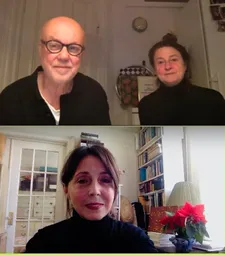 |
| Kristian Petri with Kristina Lindström and Anne-Katrin Titze on Björn Andrésen: “The scenes are like we are in a room and he is opening a door, inviting us to another room.” |
More than ever, in our visually over-saturated times, beauty and what one is supposed to look like takes a front-row seat in many teenagers’ minds, which continues on into their adulthood. That merely being rich does not guarantee a happy life seems to be more acceptable, while the myth that beauty could be the solution to life’s problems holds steady and stays hidden in many a psyche.
Tadzio’s “godlike serenity” and the projection onto this object of desire to be “utterly happy and consummate,” as Thomas Mann put it, stay in our minds as a cracked mirror throughout the documentary. Björn Andrésen asks “what happens when you don’t feel like a human being?” Beauty, so much is certain, is not to blame, but the people who feel that it is okay to exploit someone else because of it.
Joyce Carol Oates: A Body In The Service Of Mind was the Hamptons Doc Fest Opening Night Gala selection. Movie Man and The Most Beautiful Boy In The World also screened during the festival.
From Stockholm, Kristina Lindström and Kristian Petri joined me on Zoom for an in-depth conversation on The Most Beautiful Boy In The World the day before the 94th Academy Awards Oscar shortlists were announced.
Anne-Katrin Titze: Hi!
Kristian Petri: Greetings from Stockholm!
AKT: And greetings back from New York! You have this very interesting ominous start to your film. We hear about abandonment, there is a corridor, and you are leading us as if you were leading us into a mythological underworld a little bit. Tell me about the idea you had to begin this way!
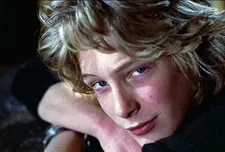 |
| Kristina Lindström on Björn Andrésen’s journey: “The story in a way is a mythological saga with very many layers in it.” |
Kristina Lindström: We talk in the mouth of each other, as we say in Sweden [meaning she and Kristian are a two-headed monster, both talking to me from the same Zoom rectangle]. It’s different things, we had the music from the start, we knew we wanted to come back to Hotel des Bains [in Venice] but it took some years to get permission, and during the editing we got hold of these audiotapes from Björn’s family from when he was a very small child. It mingled together. We’ve been talking about that, that the story in a way is a mythological saga with very many layers in it.
KP: The story of his life is like a house. The scenes are like we are in a room and he is opening a door, inviting us to another room. That is sort of the structure of the film and also the process of the film actually. That was the way we worked. Because this was personal, with very much integrity.
We were shooting for five years, so we had the luxury of waiting. Time was a very important thing in the process of this film. Also of course the house and the corridor at the beginning of this film is the Hotel des Bains, it’s the ruins of the former glorious hotel.
AKT: When did you shoot there?
KL: It was 2019, rather late.
![Kristina Lindström on filming Björn Andrésen at the Hotel Gellért in Budapest: “He had a day off while shooting [Midsommar].”](/images/newsite/Bjorn_Andresen_at_the_Hotel_Gellert_in_Budapest_225.webp) |
| Kristina Lindström on filming Björn Andrésen at the Hotel Gellért in Budapest: “He had a day off while shooting [Midsommar].” |
AKT: When you talk about the rooms, that’s very interesting. Did you change the order of the revelations for us? Were you for dramatic purposes switching things around for us?
KL: We did in some ways because we had such an amount of material with different topics. We edited the film in different chapters like a book. The mother, the film, the boy, the father.
KP: It’s an interesting question because it’s actually very similar to the process he revealed to us in real life. Quite late we were introduced to the daughter.
AKT: It’s fascinating how you present to us Visconti and the casting process. We see him walking through classrooms in Stockholm, looking for students to play Tadzio, after scouting all over Europe. In the next interview Visconti says he was the sixth boy he saw. At the Cannes Film Festival press conference in 1971, he has become the fifth boy. This is “Print the legend!” Whatever sounds better goes. How did you work with the archival footage around Visconti?
KL: We knew early when we started this film about this casting and we knew it was in different versions. It was edited in different versions in different countries. What we worked very hard to find was the press conference we asked for it in different archives and it was nowhere to be found they said.
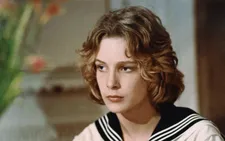 |
| Björn Andrésen as Tadzio in Luchino Visconti’s Death In Venice |
Finally we went to RAI in Rome and we sat there for three days and had them take out everything about Visconti. Suddenly, it was a negative film, we saw this press conference. It was so important for the film, because at the press conference you can see everything happen before your eyes.
KP: You don’t have to explain anything or say anything. You just look at it and everyone can feel it.
AKT: At Cannes you also have a still image with Visconti and Björn and Romy Schneider. It makes us think of her past as well as a child star, her beauty being commercialized. The beauty which catapulted them into this world of fame. Was that one of the starting points, of what you wanted to explore, what happens to beauty when it is taken in this way?
KL: Absolutely, it was the starting point. It revealed itself to us in so many layers.
KP: We were having dinner with Björn just the other day. You know, for him it has been such a traumatic experience and very many things are hidden for him. So when we worked, things were being revealed slowly. While we were having dinner, all of a sudden we were speaking about the hotel in London where they stayed when they had the world premiere [of Death in Venice]. It was the Connaught, which is one of the best hotels in London, one of the best hotels in the world maybe.
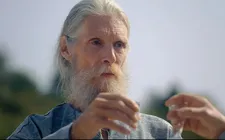 |
| Björn Andrésen in Ari Aster’s Midsommar |
We were talking about their bar because their bar has just been made best bar in the world on some list. All of a sudden Björn says, yes, I remember the waiters, they had white gloves. Sitting in Dirk’s [Bogarde] suite and we were training for the entrance of the Queen. All of a sudden he remembers; it was like that when we were shooting with him.
AKT: How is he doing, by the way?
KP: He’s quite good actually. We were giving him some Christmas gifts and he is celebrating Christmas with his daughter and actually his ex-wife.
KL: It didn’t happen since she was a little child. It’s very big.
KP: For her and for the family. I think he’s actually quite good at the moment. He seems happy and content having his voice heard after all this time.
AKT: How did it feel for you getting so much personal information, opening someone’s life up for the world to see? Did you sometimes feel you had to balance how not to be intrusive, when to step back?
KL: Of course, of course. The core has been all the time that we cannot do a film that does damage once again. It was always: what do we do by showing these pictures again? How can we show them and in which context? Every day of shooting and editing we have been thinking about this.
 |
| Image resembling Björn Andrésen photographed at the Union Square subway station in New York City on December 27, 2021 Photo: Anne-Katrin Titze |
KP: From day one, that we don’t make the same mistake one more time, exploiting him - that has been tremendously important to us.
KL: We never forced Björn to talk about a topic or a subject. He has been talking about things when he could feel comfortable to do that. It’s high density in the film. Over the years we have gained his trust together.
KP: It has been a huge responsibility and we’re still thinking about it as the film is still a living matter, it’s out there. It’s growing all the time, it feels like. We just saw that Vogue has it on the list of the best films of the year.
AKT: I did not recognize him in Midsommar. Your film revealed that to me. When we see him in the baths later on in your film, was that in Budapest filmed during that shoot?
KP: Yes, it was the famous Hotel Gellért.
KL: He had a day off while shooting.
AKT: That’s what I thought. Hotels play a big role in your film.
KP: I personally like hotels, I made a film about hotels. It’s a metaphor as a different home, sort of. It’s a transit place.
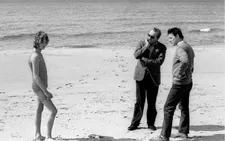 |
| Luchino Visconti discusses how to shoot Björn Andrésen’s next scene |
AKT: And you’re also being taken care of there. Which is a big point in Björn’s life - taking care, being taken care of that is missing. The text by the mother is powerful, especially when he repeats it. “I’m about to crumble” and “there’s no longer any fire to be put out.” Were you making some of these discoveries with him? How was that process of going into the past?
KL: He was always with us, we didn’t do anything without him. It’s important that this was not a film interviewing people about him, talking heads about Björn or Visconti. The audiotapes, he hadn’t heard them himself.
KP: A lot of the personal archives actually belong to his sister. This text for instance was at his sister’s. She didn’t know either when we started what was really there. They were constantly finding new things, also in his cellar and different places.
KL: I think the Super 8 films when he is an infant, we found them during the last month of editing.
AKT: When was the last time you watched Death in Venice?
KP: Good question. I think it was during the editing. I haven’t looked at it since then.
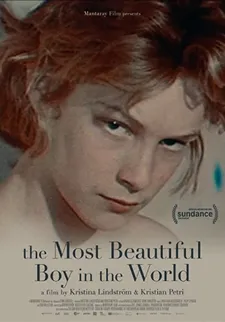 |
| The Most Beautiful Boy In The World poster |
AKT: How did you first meet Björn?
KP: We were seeing each other as we belong to the same generation in Stockholm; artists, writers, actors, they have their places. You see each other, you know about each other. But we really met 20 years ago. I was directing a children’s TV series and we cast him. I worked together with him for a couple of months. Then we kept contact after that.
Of course I was curious about Death in Venice, I wanted to ask him a couple of questions but I soon realized that he was very reluctant and felt uncomfortable, so I didn’t pursue it. It was great fun working with him. And then Kristina and I met him for dinner many years later.
KL: We are a bit different also. I asked some questions that you [Kristian] didn’t ask at the beginning.
AKT: Which questions were those?
KL: Why did you live with your grandmother? How come all this came to happen? So he started to talk about his grandmother and that he was raised without a mother and father. It was one of the doors.
KP: When we asked him the question it was not like yeah, fantastic, let’s make a movie! He took it seriously and wanted to know our vision. We had some meetings for half a year or something and then he said yes, because he liked our idea of not making a talking-heads documentary, TV style, but more like a film, a real cinema experience. He liked that and said yes and from that moment he has been all in.
KL: He also has been trusting us, like: You are the artists, you do the film.
KP: It was good that we had all these discussions before, like a rehearsal.
AKT: In his own words! By the way, I did the theatrical opening night Q&A with Stig, Stina, and Pia Lindström in New York for Ingrid Bergman: In Her Own Words.
KP: Oh cool, fantastic.
AKT: The in-your-own-words part is the thing! And you have one of the best titles of all the documentaries this year! Thank you so much.
KP & KL: Thank you, nice talking to you! All the best and Happy Holidays!
























